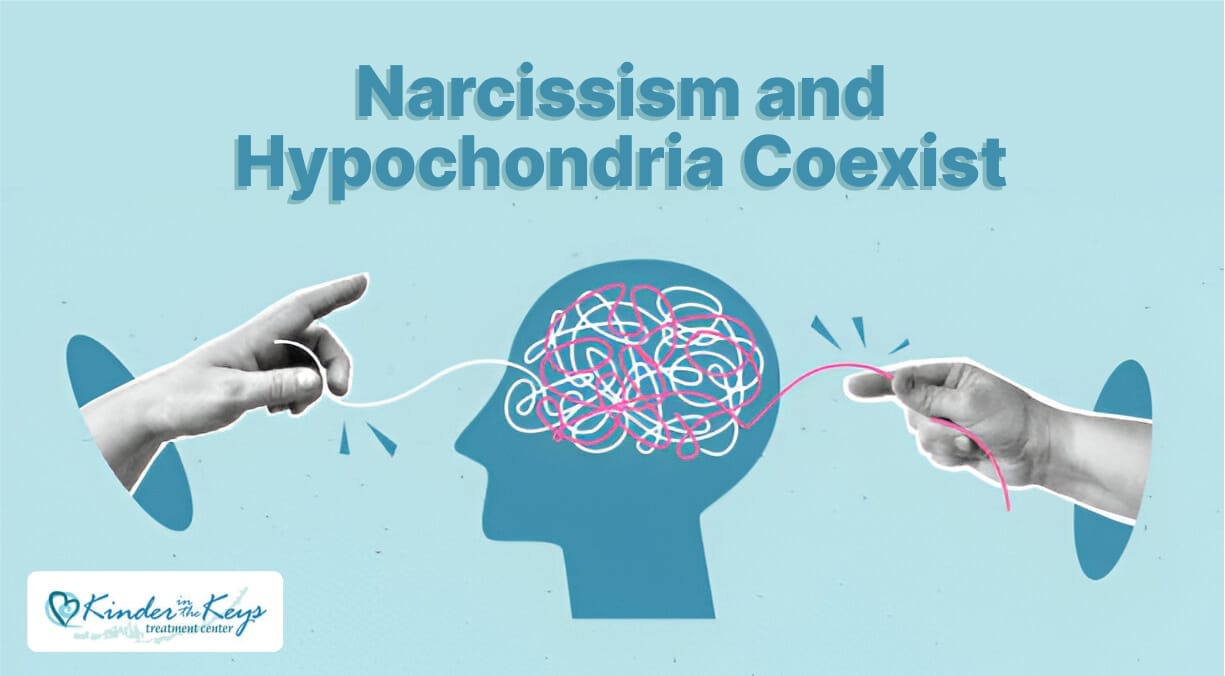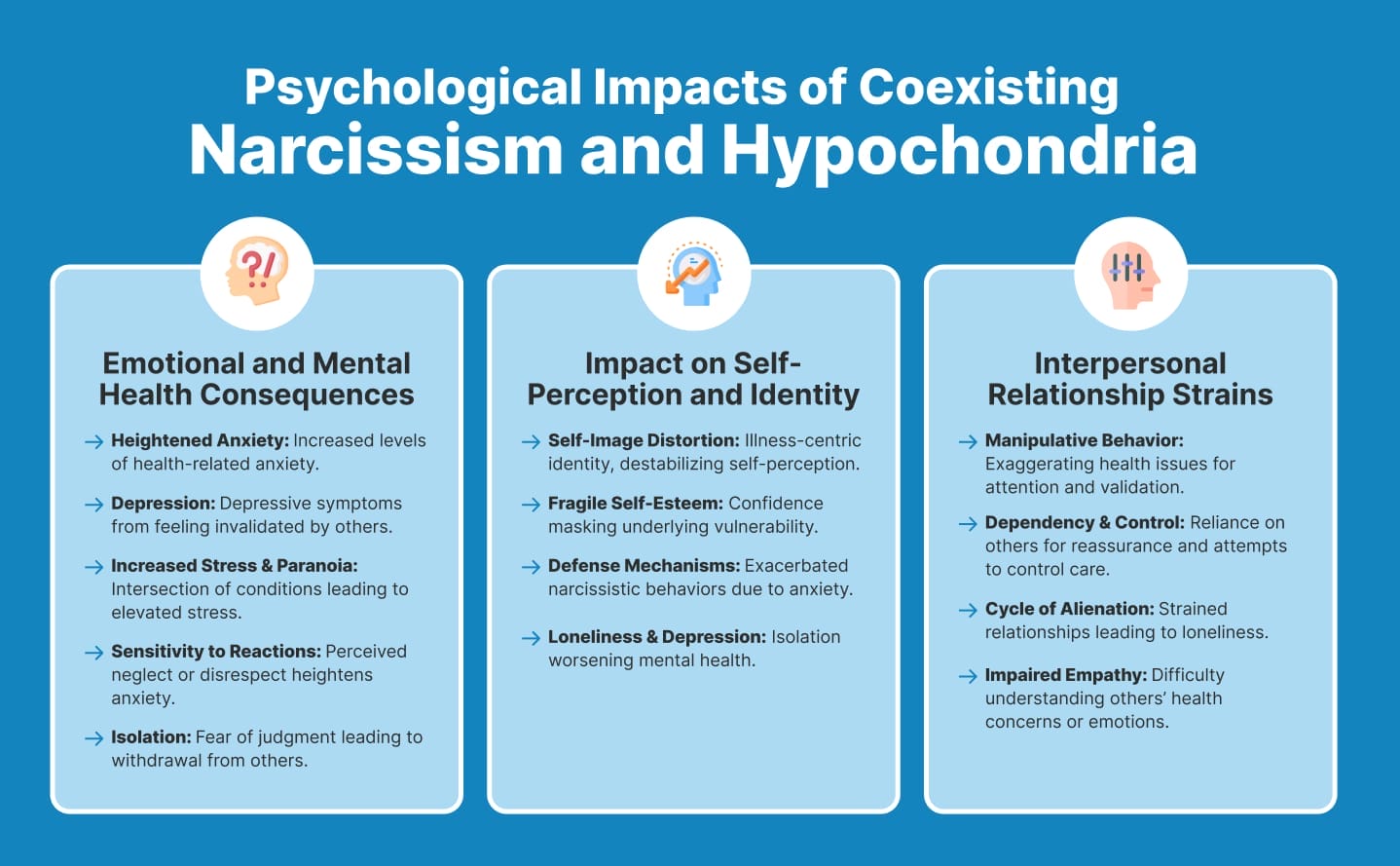At the crossroads of narcissism and hypochondria lies a complex psychological terrain.
Narcissism, characterized by an inflated sense of self-importance and a deep need for excessive attention and admiration, contrasts starkly with hypochondria, now more commonly referred to as illness anxiety disorder, where an individual is preoccupied with the idea of having a serious but undiagnosed medical condition.
Together, these disorders can create a unique psychological landscape that affects not only the individuals themselves but also their relationships with others.

The Intersection: How Narcissism and Hypochondria Coexist
Psychological Overlap Between Narcissism and Hypochondria
Narcissism, with its hallmark narcissist symptoms of grandiosity and a deep need for admiration, often leads individuals to perceive themselves as uniquely health-conscious or prone to rare illnesses.
Hypochondria, or illness anxiety disorder, involves an excessive preoccupation with having or acquiring a serious illness.
When combined with narcissism, this preoccupation can be amplified as the individual seeks more attention and sympathy, leveraging their perceived illnesses as a tool to fulfill their narcissistic needs.
Scenarios Where Traits of Both Disorders May Manifest
A narcissistic hypochondriac might use their health concerns to gain attention or manipulate others, often overstating their suffering to attract care and concern—patterns commonly seen in narcissistic abuse examples.
Both narcissists and hypochondriacs may exhibit high levels of perfectionism and a need for control over their environment and interactions. This can manifest in meticulous control over diet, exercise, and medical interactions.
Relationships can become strained as the individual demands excessive reassurance about their health from loved ones or medical professionals, intersecting narcissistic traits with hypochondriac anxieties.
Challenges in Diagnosing and Treating Overlapping Symptoms
Diagnosing a person with both narcissistic personality disorder and hypochondria poses significant challenges.
The overlap of symptoms can confuse clinicians, as both disorders involve distorted perceptions of reality—whether about oneself or one’s health. Individuals may be resistant to psychological interventions that threaten their deeply ingrained beliefs about their health or special status.
Engaging a narcissistic hypochondriac in therapy requires navigating their defenses and often fragile self-esteem, complicated by their distrust of medical or psychological assessments.
Understanding and addressing the coexistence of narcissism and hypochondria involves a nuanced approach that considers the interplay of personality dynamics and anxiety disorders.
Effective treatment strategies often involve a combination of cognitive-behavioral therapy to address distorted thinking patterns and psychotherapy to explore underlying issues of self-esteem and control.

Psychological Impacts
The coexistence of narcissism and hypochondria can lead to profound psychological impacts, not only affecting the individuals themselves but also those around them.
Emotional and Mental Health Consequences
Individuals with both narcissism and hypochondria may experience heightened levels of anxiety, particularly health-related anxiety.
The constant preoccupation with health can lead to depressive symptoms when they feel their concerns are not validated or taken seriously by others, contributing to the long-term effects of narcissistic abuse.
Narcissistic individuals may become overly sensitive to how others react to their health concerns, interpreting lack of concern as neglect or disrespect—a dynamic that closely mirrors how victims of narcissists feel. This can heighten their anxiety and stress.
Due to their excessive concern about their health and the need for special treatment, individuals may isolate themselves from others, fearing that their needs won’t be adequately met or that they will be judged negatively.
Impact on Self-Perception and Identity
Narcissism involves an inflated self-image, but when coupled with hypochondria, this self-image can become increasingly linked to being ill or at risk of illness. This may lead to a self-identity overly centered around being ill or vulnerable, which can be both psychologically destabilizing and self-perpetuating. While narcissists may appear overly confident, their self-esteem is often fragile.
The added anxiety related to health can exacerbate feelings of vulnerability, leading to more pronounced narcissistic behaviors as a defense mechanism.
Interpersonal Relationship Strains
The need for attention and validation can drive those with this combination of disorders to manipulate those around them by exaggerating or fabricating health issues. This behavior can strain relationships, leading to a cycle of alienation and loneliness.
Additionally, these individuals may develop an unhealthy dependence on others for constant reassurance about their health, coupled with attempts to control how others care for them, which can lead to conflicts and resentment in close relationships.
Challenges in Social Interactions
The overwhelming focus on personal health issues may lead these individuals to withdraw from social interactions, particularly in settings they perceive as threatening to their health. This withdrawal can exacerbate feelings of loneliness and depression.
Narcissistic traits can impair empathy, making it difficult for individuals to understand or relate to the health concerns or emotional states of others, further complicating social relationships.

Coping Strategies for Individuals
Cognitive-Behavioral Techniques
Cognitive-behavioral techniques, such as reality testing, help individuals question the validity of their beliefs about their health and social interactions. This method is essential in reducing the distortions that often accompany both narcissism and hypochondria.
Mindfulness and meditation are also beneficial, helping individuals stay centered and reduce tendencies toward emotional volatility and hypervigilance.
Therapeutic Interventions
Individual therapy focuses on exploring the underlying causes of both narcissism and hypochondria, addressing core issues such as fragile self-esteem and an over-reliance on external validation for emotional stability.
For instance, a narcissistic therapy group provides a supportive environment that challenges distorted perceptions and reduces feelings of isolation.
Lifestyle Adjustments
Incorporating routine physical activities and maintaining a balanced diet are crucial lifestyle adjustments. These changes not only help in managing symptoms but also promote a healthier and more balanced lifestyle, enhancing mood stability and general well-being.

Support for Families and Friends
Education and Awareness
Educating oneself about narcissism and hypochondria is crucial for developing understanding and empathy.
Participating in workshops and abuse therapy can provide valuable insights and practical strategies for effectively interacting with someone dealing with these complex psychological issues.
Communication Strategies
Effective communication involves establishing clear and boundaried interactions that avoid confrontations and focus on supportive and understanding dialogues. This approach helps maintain constructive relationships and encourages supportive exchanges that can facilitate the individual’s recovery journey.
Encouraging Professional Help and Self-Care
Encouraging a loved one to seek professional help should be approached sensitively, emphasizing the benefits of therapy without making it seem like an ultimatum.
It is also vital for supporters to look after their own mental health by establishing personal boundaries and seeking their own support systems, ensuring they remain resilient and prevent caregiver fatigue.
Embracing Resilience and Recovery
The intersection of narcissism and hypochondria offers both challenges and opportunities for growth.
For those affected, engaging with therapeutic strategies and supportive resources can pave the way toward resilience and better mental health. It’s essential for both individuals and their support networks to foster environments that encourage recovery and personal development.
Through perseverance and informed support, navigating the complexities of these conditions can lead to a more balanced and fulfilling life.
